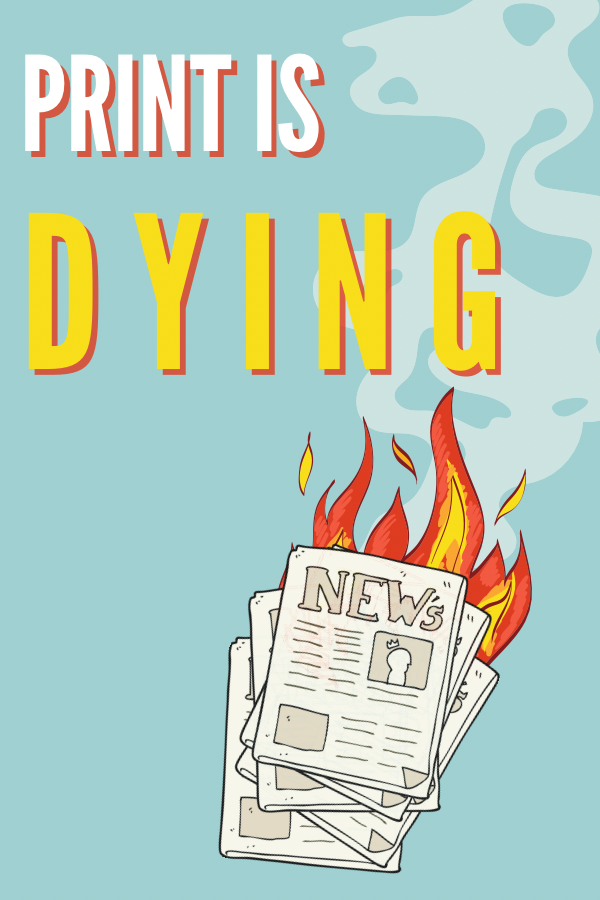The downfall of print news
October 19, 2022
On Sept. 25, 1690, the first known print newspaper was released to the public in Boston, MA. Printed by Richard Pierce and edited by Benjamin Harris, the Publick Occurrences was intended to be released once a month with content that informed Bostonians of events in their city. Only four days after publication, the newspaper was banned by the Governor and Council under claims that Pierce and Harris acted without regard for authority. The newspaper had an untimely death, but its impression on the public remained.
Following suite of the Publick Occurrences, in 1704 the Boston News-Letter was born. Bookseller and Postmaster, John Campbell, acted as first editor and the Boston News-Letter went down in history as America’s first continuously-published paper. According to paperage.com in an article titled, “The First Newspapers in America,” this pamphlet focused on news from London journals and important information concerning the European wars. Citizens now had access to news of their country by simply picking up the most recent edition of the newspaper. It was the Boston News-Letter that led to the chain reaction of the formation of newspaper companies throughout the United States. Since this point in history, Americans have had the privilege to easily access news by way of buying the paper.
As times have changed, so have the methods in which people receive their news. While we once lived in a world where news was printed on paper and delivered to our front door, it is now as easy as an internet search. This can be seen in many folds, for some the need for tangible printed press is no more. But for those that love the craft of journalism, it cannot help but be heart wrenching to watch the downfall of such a legacy. To think that soon enough there may be a point where printed press is virtually nonexistent.
For many newspaper companies, financial struggles and even bankruptcy have become a tragic reality. In a New York Times article by Katie Robertson and Marc Tracy, titled “McClatchy, a Major U.S Newspaper Chain, Files for Bankruptcy,” it is revealed the true decline in the interest of printed press.
“The state of the business is dismal. Roughly a quarter of the newspapers in the United States, most of them weeklies, have been shut down since 2004, and about 50 percent of newspaper jobs have been eliminated in that time. Daily weekday print circulation for newspapers nationwide has plummeted by about 50 million in the last 15 years.”
Print media is a rich experience that has been taken for granted since the early 2000’s and the evolution of digital media. Despite living in the age of technological advances, there is something grounding and authentic about walking down the street and stopping to pick up the weekly paper. The ability to physically hold a freshly printed paper hot off the press, to see the pictures, feel the textures and read the words of passionate writers. When the paper is gone, we will have only the lights of phone screens to keep ourselves aware of the current times. Being published on the front page of the paper will no longer be a big deal, memorable newspaper clippings will no longer be saved. In a Routledge article titled, “The Future of Journalism: New Skills, Old Values,” it is explored how the legacy of early journalism should be preserved in modern-day.
“In this environment, professional journalism risks being traduced, swamped or taken for granted as a source of well-sourced, reliable and well-presented news. It needs to cling to the principles and values of good journalistic practice that long predate the digital age, but whose relevance and worth remain undiminished. For all those internet users interested only in reinforcing their own prejudices, there are plenty of others seeking trusted guides to lead them through the chaotic information overload of the modern age. Journalism needs to offer that guidance, and to continue to expose wrongdoing and hold power to account.”
As journalists in the modern day, it is an important mission to keep alive the foundational aspects that began the craft. While the new times have prompted for a change in how often printed editions can happen, it is still a shame to be a contributing factor in the elimination of printed press altogether. Doing so shows a disregard of important roots that should be held to a higher regard by upcoming journalists.




